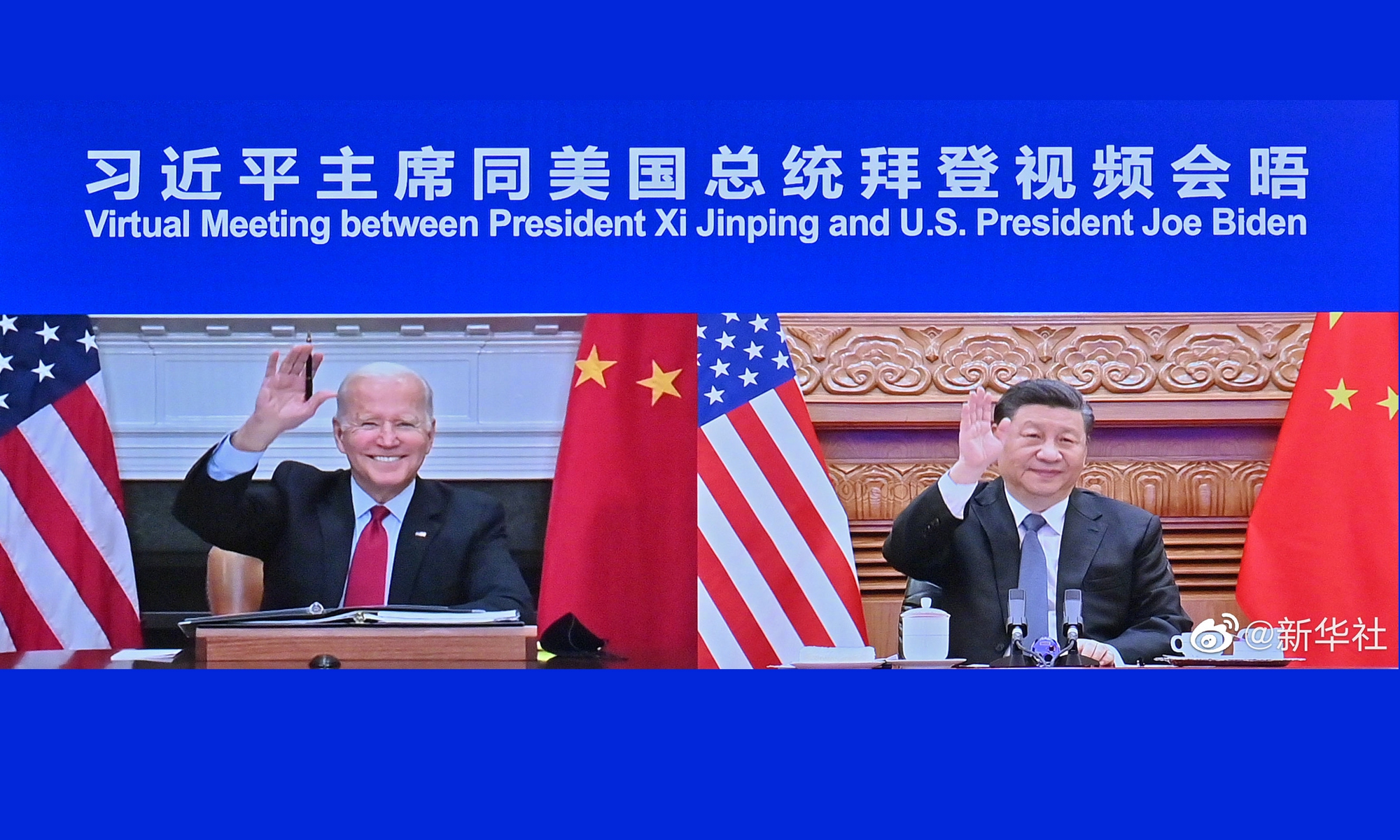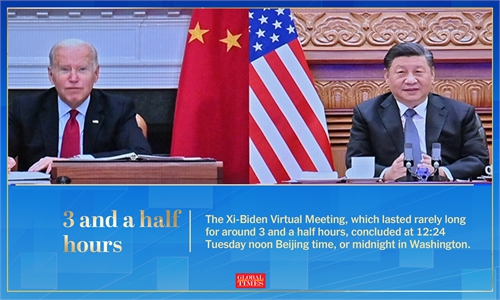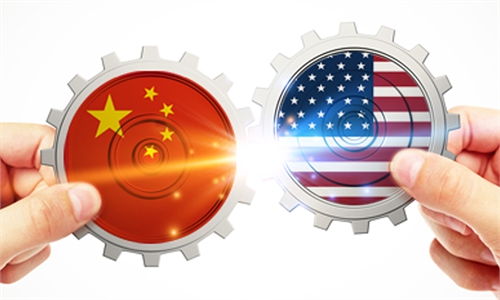
Chinese President Xi Jinping met with US President Joe Biden on Tuesday morning (Beijing time), the first face-to-face meeting virtually since Biden took office. (Photo: Xinhua)
Editor's Note:The virtual summit between Chinese President Xi Jinping and US President Joe Biden on Tuesday, the first such meeting between the two countries since Biden took office, attracted global attention. Other than issues of mutual concern, the trajectory of China-US ties will have far-reaching implications. The Global Times collected the opinions of three Russian scholars, Yuri Tavrovsky, Danil Bochkov and Sergey Biryukov, on this significant meeting. Tavrovsky is head of the Expert Council of the Russian-Chinese Committee for Friendship, Peace and Development. Bochkov is an expert at the Russian International Affairs Council. Biryukov is a PhD in political science and professor at the Siberian Institute of Management, Novosibirsk.
Highlight
Tavrovsky: Apparently it was a very substantial discussion; otherwise, it wouldn't last for 3.5 hours. It was a meeting of two equally strong world leaders and the American President didn't even try to speak from the "position of strength." The highlight was Biden's agreement with the Chinese official position on Taiwan.
Bochkov: The highlight of the meeting from my perspective is holding it, since the idea was floating in the air for quite a time - even reportedly rejected at some point. At the end of the day it could help slightly bridge all-round confronting positions and pave the way for better communication. It similarly happened following the Biden-Putin summit after which both states ramped up back-channel interaction on security and diplomatic issues.
Presidents exchanged opinions on a variety of issues, even stepping aside from most neutral and obvious topics, such as climate change, and touched upon more urgent issues including economic cooperation, Taiwan Straits and the Indo-Pacific, which signifies their true desire to keep relations away from veering into Cold War-like confrontation. The most crucial takeaway of the meeting might be the reestablished personal bond between the top leaders following a lack of personal communication between them, which - if not lost - would help manage the competition responsibly.
Biryukov: The key thing is direct contact between the leaders of two great powers. By the way, it was a frank conversation during the 3.5 hours, which was conducted correctly. Two countries' leaders agreed to compete in global policy according to certain rules. It may have the positive consequences for world policy.
Taiwan question
Tavrovsky: I don't think so. Entire strategy of this administration in the Pacific will be compromised in case of retreat in this Taiwan offensive.
Bochkov: The [cross-Straits] tensions are motivated by a broader competition of the regional influence between the two countries rather than just a competition over the island itself. Moreover, President Biden, though sticking to "One China" policy, at the same time noted the he "strongly opposes unilateral efforts to change the status quo…" and that US upholds the "importance of a free and open Indo-Pacific," both of which might be signs that the US is not retreating from the region either.
Both leaders remained committed to their key positions on the pressing issues. President Xi warned of any provocative moves over Taiwan which would be "playing with fire." Still, Washington demonstrated its willingness to mitigate some ambiguity following previous remarks by President Biden concerning its relations with Taiwan. The US specifically stressed its one-China policy. The presence of the trade officials on both sides during the talk may be a sign of looming improvement in bilateral economic relations following years of a trade war.
Biryukov: It can be assumed that a certain easing of tension in the situation around the Taiwan Straits will occur, since both sides of this dialogue, which are solving long-term strategic tasks, do not need the current escalation. It can be assumed that President Biden, as a professional and experienced politician in the field of international relations, will be able to neutralize the openly confrontational approaches that exist in the minds of part of the American political establishment. Since the approaches of China and the US to solving the above-mentioned situation differ significantly, a deeper convergence of their positions on the issue is hardly possible in the near future. But we can hope that the pragmatic approach to building bilateral relations of two sides help them to avoid an unnecessary aggravation.
US domestic obstacles
Tavrovsky: Anti-Chinese mindset is typical for the entire American political class both within and outside the administration, Democrats and Republicans. Neoconservatives like Obama, Clinton and Blinken are influencing Biden and major policymaking mechanisms of his administration. A containment strategy is in the process of unfolding on military, trade, ideology tracks and have powerful dynamics. I don't see a powerful counterforce.
Bochkov: Obviously, inner politics will continue to have its impact on China-US relations, since all steps President Biden is doing are aligned with the US domestic realities and are aimed at his electorate. As his administration was framing it - a foreign policy must be for the American people and the middle class.
Today there is a consensus among US politicians to see China as a rival and competitor, and craft methods of how to steer them, like restrictions. This includes, for example, the ban on China's tech giants, such as Huawei and ZTE, and the $250 billion bill passed by the US Senate in June to maintain a competitive advantage over China in cutting-edge technologies.
The bill has been given a new impetus by the reports that its provisions are to be included in the annual National Defense Authorization Act.
Biden also just signed his flagship $1.2 trillion infrastructure bill into law, getting rare bipartisan support. The program among other things aims to bridge the gap in infrastructure development between the US and China.
Biryukov: The Biden administration is trying to consolidate the political establishment and reassure American society after the upheavals of the last election campaign. In addition, Biden is involved in a complex process of reconsolidation of what is commonly called the Western community, and needs to normalize relations with China at the moment. However, the process of consolidation within the US is difficult, which is confirmed by the difficulties with passing through the US Congress a large-scale infrastructure project initiated by Biden. The radical wing of the US Democratic Party is quite strong, which creates obstacles for President Biden, who represents the moderate wing of the same party and wants to solve the tasks facing him. Biden will try to overcome the obstacles to his pragmatic policy, but it will not be easy.


